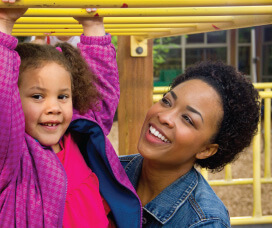
Parent-child communication after divorce really matters.
By Rosalind Sedacca, CDC
It’s no secret that one of the biggest challenges a divorced parent faces is maintaining good communication with your children. Obviously all parents struggle with communication issues as their children grow, but children who have had their lives dramatically altered by separation or divorce need even more attention – and diligent observation by their parents.
Children tend not to tell you when they are angry, resentful, confused, hurt or depressed. Instead they reflect their problems through their behavior – acting out or perhaps turning inward in ways that you may not have experienced prior to the divorce.
Here are some tips that most professionals agree are good ways to encourage positive and productive post-divorce communication between you and your children. Many of these are obvious or natural behaviors. Some can easily be forgotten or overlooked amid the challenges you are juggling in your own life from day to day.
1) Be available and attentive when your child comes to you to talk or ask questions. That means turning off the TV, putting down tablet or computer, not answering the phone and giving them eye contact and a welcoming smile. Sometimes attempting to talk to you is the result of considerable thought and risk on their part. Encourage these conversations when they happen.
2) It is helpful to sit, kneel or in other ways get down closer to your child’s level when you talk. Towering over them is a form of intimidation that does not translate into safety or trust.
3) Keep your conversations private unless they want to include others. Let them know they are safe in confiding to you and that you are interested and care about matters that concern them.
4) Don’t dismiss a subject lightly if it is bothering your child. Laughing, joking or teasing will create alienation that ultimately will discourage your child to share what is bothering them in the future. This is a dangerous road to travel, especially as your children develop into their teen years.
5) Equally important, never embarrass your children or put them on the spot in front of others. This will immediately close the door to honest, trustworthy communication.
6) Avoid talking to your child when you are angry or upset with them or others. Promise to talk in a half-hour or hour at a specific place after you’ve had a chance to calm yourself, settle down and regain your objectivity.
7) Be an active listener. Don’t interrupt while your child is talking. Listen carefully and then paraphrase back what you heard them say. Ask if you’re right in your interpretation. They’ll tell you. This give and take will help you more precisely understand what is really at issue.
8) Take time to see the world through your children’s eyes and you will be better able to meet their needs, understand their confusion, hurt or aggression and find appropriate ways to dissolve tension through your conversation and caring behaviors.
9) Asking why can be intimidating and close off your conversation. Instead ask what happenedquestions that keep the dialogue open.
10) Be patient. Don’t react or respond until you get the full message. Sometimes it takes some meandering for your child to reach the crucial point of what they want to say. Don’t shut them off too soon!
11) Listening is your most valuable skill and tool. Remember that preaching, moralizing or “parenting” comments can put up barriers to clear communication.
12) Watch your judgments and put-downs, even with upsetting information. Don’t belittle your children, call them names or insult their behaviors. Talk to them – not at them! The difference is felt as respect.
13) Acknowledge your children for coming to you. Praise their braveness. If you were at fault, apologize honestly and discuss how you can make changes for the future. Encourage them to talk further with you about other concerns or fears.
14) Show that you accept and love them – even if their behaviors were not acceptable. Then help them come up with some acceptable solutions they can understand and feel good about.
Children who feel safe talking to their parents grow up as better communicators overall. They will be more likely to have healthy communication in their own adult relationships – with their spouses and children.
Families that keep feelings repressed, that don’t discuss issues that come up, send the message that it’s not all right to talk about things that bother us. The consequences of this can be seen in our nightly news headlines every day. Feeling comfortable talking to you is crucial to a healthier childhood and adulthood.
You can open the doors to caring communication in your home by starting today. Your children may be a little resistant at first as they test the waters, but they will surely appreciate this opportunity once they know you are sincere. Start the process yourself – and see how valuable it is to “hear” what your children have to say!
* * *
Rosalind Sedacca, CDC is founder of the Child-Centered Divorce Network and a Divorce & Co-Parenting Coach. She is the author of several online books and programs including the ebook, How Do I Tell the Kids About The Divorce? A Create-a-Storybook Guide to Preparing Your Children — With Love! For her free ebook on Post-Divorce Parenting: Success Strategies for Getting It Right!,free articles, coaching services and other valuable resources on divorce and parenting issues, go to: www.childcentereddivorce.com.
© Rosalind Sedacca All rights reserved.




